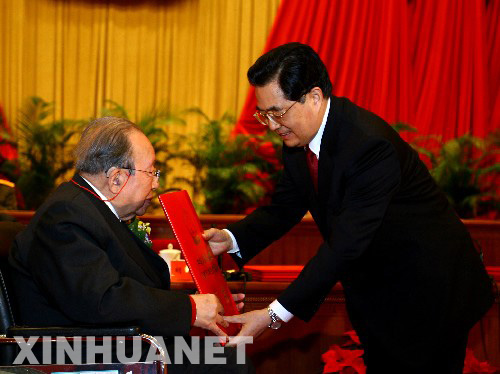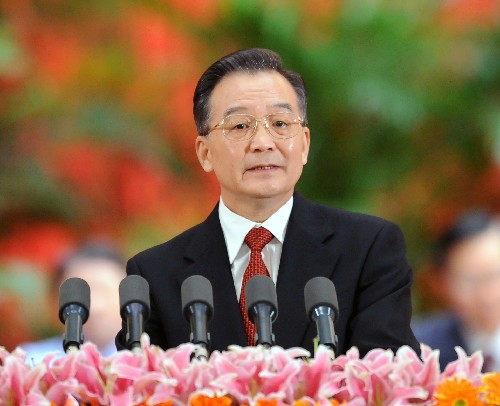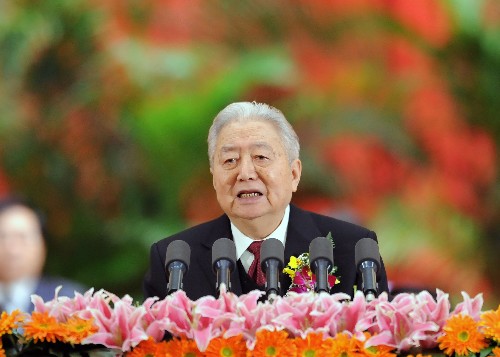




China granted its State Scientific and Technological Award for 2007 in Beijing on Tuesday to petrochemical scientist Min Enze and botanist Wu Zhengyi for their outstanding achievements.
Chinese President Hu Jintao, with other senior leaders, presented the awards to two scientists, 5 million yuan (about 685,000 U.S. dollars) each, at the annual national science-technology award ceremony at the Great Hall of the People.
Senior petrochemical engineer Min, 84, a native of Sichuan Province in southwest China, is a member of the Sinopec Science and Technology Committee and a senior advisor of the Research Institute of Petroleum Processing (RIPP).
Min graduated in 1946 from the then National Central University and obtained a doctorate in chemical engineering from Ohio State University in 1950.
Min became an academician of the Chinese Academy of Sciences (CAS) in 1980, a research fellow of the Third World Academy of Sciences in 1993 and an academician of the Chinese Academy of Engineering in 1994.
As an innovator in petrochemical technology, Min laid the foundation of petroleum refining applied catalysis in China, according to the award review committee.
Min has dedicated his life to the study of petrochemical and chemical engineering. The committee praised his work as an explorer in the research and development of petrochemical green chemistry, as well as his efforts to make better bio fuel.
Botanist Wu, 91, a native of eastern Jiangxi Province, has been engaged in botanical research and education for 70 years. "He is an authority in the fields of systematic botany and plant geography as well as plant diversity, conservation and sustainable use of plant resources," the committee remarked.
The botany professor, also a CAS senior academician, graduated from the biology department of the elite Beijing-based Tsinghua University in 1937 and later became director of the botany institute of CAS.
As the chief editor of Flora Reipublicae Popularis Sinicae, or "Flora of China", which showcases the work of three generations ofbotanists, Wu played the key role. His critical contributions made the book "the most comprehensive of its kind that characterizes plant species and distributions in China," the review committee said.
Wu organized several extensive surveys of plant resources in East Asia, especially the biologically rich Yunnan Province in southwest China.
"He has published research on 1,766 new taxa of plants in his study of plant taxonomy, which makes him the top botanist in China in terms of the number of plants that were discovered and named," the committee said.
Premier Wen Jiabao said in a keynote speech that China had reached a stage in its history where it was more dependent on scientific and technological innovation, and it should strive to enhance its innovative capabilities, which were a national strategic priority.
Government and Party officials should "make friends with scientists" and "extensively take their advice", Wen said, adding the country should create a sound, respectful environment for scientists and scientific progress.
The premier called for major technological breakthroughs in key fields such as exploration of energy resources, environmental protection, pollution control, product quality, food safety and safe production.
Other Party and government leaders -- Li Changchun, Xi Jinping and Li Keqiang -- also attended the event and presented awards to other scientists and enterprises for significant scientific contributions.
On Tuesday, the country also awarded outstanding research and development projects. Prizes were granted to the projects of physical science, those of technology innovation and those of application of scientific findings and technological development.
Although most of the winning projects of the former two types were done by scientists on campus or at institutes, Chinese enterprises have played a bigger role in technological application.
About 57 percent of more than 200 winning projects in the third group were fully or partially carried out by enterprises, said Hu Xiaojun, deputy director of the awards office.
The enterprises also funded 70 percent of these projects, Hu said.
The nature of the projects that were awarded show "science and technology is playing an important role in improving people's livelihood, which is the aim and outcome of technological development", according to award office director Chen Chuanhong.
Chen said most of the winning projects were products of more than a decade of research, highlighting "the contribution made by researchers working on the frontline".
Meanwhile, Chinese returning from studying overseas participated in one third of the projects. Premier Wen encouraged science workers to "use any excellent international technological achievements and resources available".
The award winners also included three workers and farmers. Both representatives of Hong Kong and Macao special administrative regions were prominently awarded. The Chinese University of Hong Kong won a second prize for a medical breakthrough.
The International Rice Research Institute, and four foreign scientists -- British geophysicist Li Xiangyang, U.S. materials scientist Liu Jinchuan, Russian geographer N. L. Dobretsov and German biologist Peter Gruss -- won the international technological cooperation award for their collaboration with Chinese scientists.
Tuesday's ceremony was jointly held by the Central Committee of the Communist Party of China and the State Council.
Since the State Scientific and Technological Award was established in 2000, 12 Chinese scientists have received the five-million-yuan top award, including atmospheric physicist Ye Duzheng, liver and gall specialist Wu Mengchao, hybrid rice developer Yuan Longping, mathematician Wu Wenjun, IT expert Wang Xuan and wheat breeding expert Li Zhensheng.
China's R&D spending should reach two percent of the GDP in 2010, according to the 11th Five-Year Plan (2006-2010).

